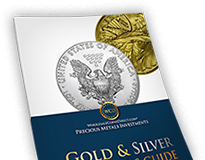
What Is Inflation? | How to Combat It & Why It Matters
Inflation is a word that can be frightening to many. From those looking to save their wealth to those looking to ensure they've made a wise investment. But what is inflation? Inflation refers to the gradual increase in prices of goods and services, reducing the purchasing power of money over time.
Inflation can erode your investments' value and diminish your savings' purchasing power. This means that the same amount of money invested today may not be able to buy as much in the future. For example, if you invest $1000 in a savings account with a low interest rate and inflation is higher than that rate, your money won't grow enough to keep up with rising prices. Consequently, the real value of your savings diminishes.
What is Inflation?
A general increase in prices of goods and services over time decreases the purchasing power of money due to inflation. As inflation takes place, a dollar has the power to purchase fewer and fewer goods and services. It's essentially a decrease in the value of money, where the cost of living typically rises. Various factors, such as increased demand, higher production costs, excessive money supply, or other economic influences, can cause inflation. It's commonly measured by tracking changes in the Consumer Price Index (CPI) or the Producer Price Index (PPI) over time to gauge the overall price increase in an economy.
For investors, inflation matters because it erodes the purchasing power of money over time.
Impact on Investments: Inflation affects the returns on investments. For instance, if the rate of return on an investment is 5%, but the inflation rate is 3%, the real return (adjusted for inflation) is only 2%. Inflation can eat away at the value of investment returns.
Effect on Interest Rates: Central banks often adjust interest rates in response to inflation. Higher inflation might lead to higher interest rates to control the money supply. This can impact various investment vehicles, like bonds or loans.
Asset Valuation: Inflation can influence the valuation of assets. For instance, during inflationary periods, real assets like real estate or precious metals might retain or increase their value compared to cash, which loses value due to inflation.
Risk Management: Investors need to consider inflation when assessing risk. Higher inflation rates might signal economic instability, impacting investment decisions across different sectors and asset classes.
Understanding inflation is crucial for investors as it can significantly impact the performance and value of their investments over time. Keeping an eye on inflation rates and considering their effects when making investment decisions is key to managing risk and maximizing returns. The IMF link you provided likely delves deeper into these concepts, offering additional insights and examples of inflation's impact on investments.
Why Inflation Matters:
Inflation is like a sneaky force that increases prices over time so your money can buy less stuff. That's why it's important to find ways to keep up with it, like by investing your money smartly.
Inflation messes with how much things cost for everyone, from how you pay for stuff to how businesses manage their money. It affects taxes, how the government spends money, and even the jobs available. It's good when inflation stays low and steady because it means the economy is doing well and more people are working and getting paid better. But if it goes too high or low, things get pretty messy.
Saving money in a regular bank account doesn't help much because the interest you get usually isn't enough to keep up with inflation. Investing is a better option because it helps your money grow and strengthens its buying power.
When planning your money for the future, it's crucial to consider inflation. That way, you can ensure you're saving enough to afford things when prices increase.
Causes of Inflation
One major reason is when demand shoots up, there aren't enough goods or services to meet that demand. It's like when everyone suddenly wants the same toy, but there aren't enough toys for everyone—so the price goes up. This increased demand without enough supply is a big player in inflation.
Sometimes, the cost of making stuff rises, like when the price of materials or wages for workers increases. Businesses need to charge more for their products to cover these increased costs. This increase in the cost of production can get passed down to consumers, making things pricier and contributing to inflation.
Another cause is when there's too much money circulating in the economy. If there's a lot of money but not enough stuff to spend it on, it can push prices higher. Imagine playing a game where everyone suddenly gets more money, but the number of things you can buy stays the same—prices will likely go up because everyone has more money to spend.
How to Combat Inflation: Portfolio Diversification
Diversifying your portfolio is like having many different tools to battle inflation. You're not putting all your eggs in one basket when you spread your investments across various assets—like stocks, bonds, real estate, and maybe even precious metals. Different types of investments can react differently to inflation. For instance, stocks might perform well during inflation because companies can increase prices, while bonds might struggle since their fixed interest rates might not keep up. By having a mix, some parts of your portfolio might do better when prices rise, helping balance out the impact of inflation on your overall wealth. It's like having a team with different skills—each member can step up when needed, creating a stronger defense against the sneaky effects of inflation on your money.
A 'hedge against inflation' is like a shield that helps protect your money from losing value when prices rise. It's a way to guard your wealth from being eroded by inflation. Investments or assets that tend to perform well when inflation goes up are often considered hedges against inflation. For example, things like real estate, stocks of certain companies, commodities like gold or silver, and certain types of bonds can act as hedges because their value may increase when inflation is high. These investments have the potential to counterbalance the effects of rising prices, helping your overall portfolio maintain its value or even grow during inflationary periods. Essentially, they work as a defense mechanism for your money against the sneaky impacts of inflation.


Bottom Line
Exploring investment options during uncertain economic times? Look no further than the U.S. Gold Bureau. Secure your portfolio and safeguard your savings by choosing the U.S. Gold Bureau. The U.S. Gold Bureau ensures authenticity, reliability, and a seamless precious metals acquisition process.
Ready to fortify your investments? Take the first step by calling the U.S. Gold Bureau today.






